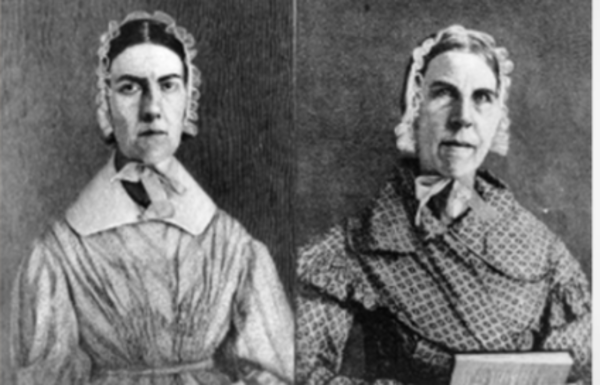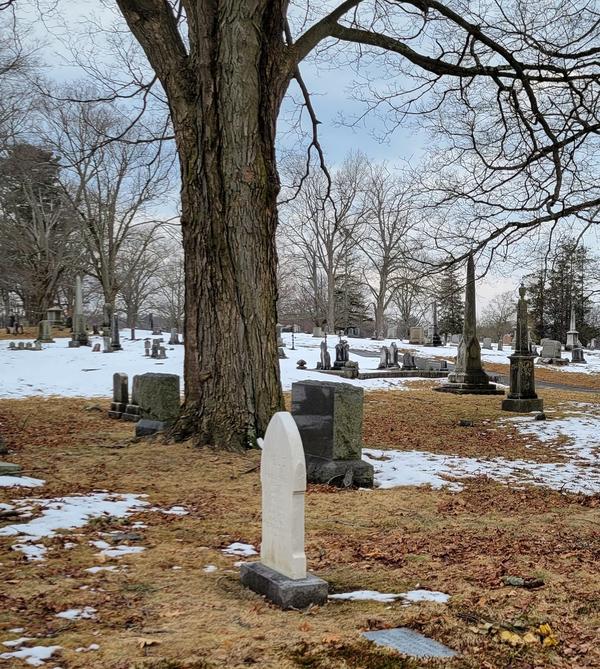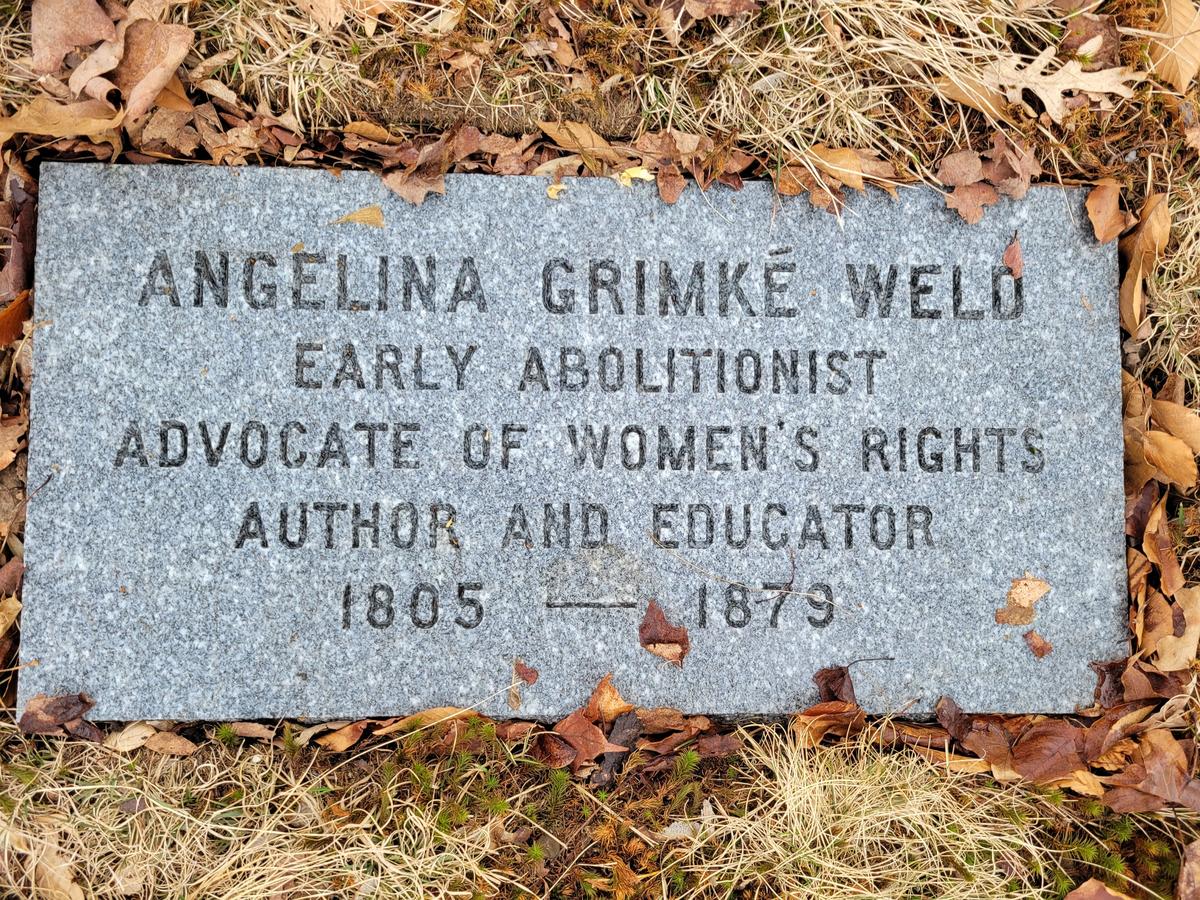Stories from Mount Hope: The Amazing Grimké Sisters
March is Women’s History Month and so it is an ideal time to feature Sarah and Angelina Grimké, who really should be much better known than they are. These sisters were both pioneering abolitionists and supporters of women’s rights.
The final resting place of two remarkable sisters, who were among the best known civil rights activists of their day, are marked by a marble gravestone off Evergreen Walk. Sarah and Angelina Grimké were born in South Carolina. Their father was a plantation owner who held a large number of slaves. Sarah accompanied their father on a journey to Philadelphia he undertook for medical treatment in the 1820s, and here she was first exposed to Quakerism. She eventually converted and moved north, and soon her youngest sister, Angelina, followed. By their teens, both sisters had started to question the enslavement of fellow human beings, and their move to the North only further solidified their beliefs.
By the early 1830s, Sarah and Angelina became involved in the abolitionist cause and were appointed the first female abolitionist agents in the United States. They quickly became known for their speaking prowess. Originally, they were sent out to speak to small groups of ladies in their parlors. But word spread about them, and they had to move to larger, public venues. They had a compelling story and no fear of speaking to large crowds for their cause. Quite soon the large crowds they were addressing consisted of both men and women. In the 1830s, speaking in front of co-ed groups was pretty shocking. The sisters were subjected to much criticism, but they felt their cause was too important to worry about what others thought of them.
On February 21, 1838, Angelina became the first woman to speak to a legislative body in America when she delivered an address at the Massachusetts State House. Her speech was ostensibly an accompaniment to delivering petitions to the legislature, with over 20,000 signatures of people demanding the abolition of slavery. But Angelina gave a speech that was not only about the abolitionist cause but also about women’s rights — 10 years before Seneca Falls! She argued women, if given equal suffrage, would be able to bring about the end of slavery and other societal woes. Alas, they largely retired from their speaking careers after 1840.
Angelina had married Theodore Dwight Weld in May, 1838. Theodore was another abolitionist agent known for his great speaking abilities. Sarah resided with them throughout their marriage, helping to raise their children and run their household. They became educational advocates and lived a less public life.
The Weld/Grimké family moved to Hyde Park in 1864. In 1870, when the MA Woman Suffrage Association was created, both Sarah and Angelina were vice presidents on the Board. That same year on March 7, 1870, Sarah and Angelina led a pioneering suffragist protest. They brought a group of 42 women to a town election being held at the Hyde Park Town Hall in Cleary Square. Back then, Hyde Park was an independent town (not a neighborhood of Boston as it is today). The election official (who was a Grimké groupie) let the women vote — but he put their ballots in a separate box. So, while the women’s ballots were not counted in the tally, they succeeded in making their point. It was a small action, but it got quite a bit of publicity. Other suffragists went on to try the same process in the 1870s, but with much less success than the remarkable Grimké sisters.
In an all too familiar story, a brother of the Grimké sisters, Henry, took an enslaved woman named Nancy Weston as a partner, and they had 3 sons. While Henry’s will asked his family to treat his biracial children in the same manner as the children from his marriage, the Southern portion of the family did not. But, of course, the sisters embraced them equally. They helped pay for their education and supported them. Their middle nephew, Rev. Francis J. Grimké, married Charlotte Forten (the first African American graduate from Salem State!). Charlotte Forten Grimké was an abolitionist and educational reformer. Like many others, her involvement in those movements led her to be a suffragist, too. Their nephew, Archibald, was a major player in the burgeoning civil rights movement of the early 20th century.
In recent years, the Hyde Park Historical Society has spearheaded efforts to honor the Grimké sisters and acknowledge their extraordinary place in American history. A new bridge over the Neponset was named for them in 2019. A new marker for Angelina was placed in Mount Hope Cemetery in autumn 2021 (since her name is not on the original headstone). That marble headstone with Theodore and Sarah’s name was also cleaned. While not the household names they once were, people still appreciate these extraordinary sisters.
Written by Gretchen Grozier and edited by Sally Ebeling, March 2022
Bibliography:
- Mass Moments
- Lift Up Thy Voice The Grimké Family’s Journey from Slaveholders to Civil Rights Leader, Mark Perry, Viking, 2001
- ‘HPHS Restores Weld-Grimké Plot’, The Boston Bulletin, Matthew McDonald 1/6/2022
- The Grimké Sisters of South Carolina, Gerda Lerner, Oxford University Press, 1998
The Stories of Mount Hope blog features periodic posts on a variety of topics concerning historic Mount Hope Cemetery. This blog is hoping to unearth the hidden stories of Mount Hope Cemetery. Please let us know if there is something you think should be highlighted by emailing storiesfrommounthope@boston.gov




